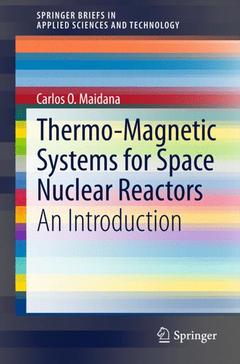Thermo-Magnetic Systems for Space Nuclear Reactors, 2014 An Introduction SpringerBriefs in Applied Sciences and Technology Series
Auteur : Maidana Carlos O.

Introduces the reader to engineering magnetohydrodynamics applications and presents a comprehensive guide of how to approach different problems found in this multidisciplinary field.
An introduction to engineering magnetohydrodynamics, this brief focuses heavily on the design of thermo-magnetic systems for liquid metals, with emphasis on the design of electromagnetic annular linear induction pumps for space nuclear reactors. Alloy systems that are liquid at room temperature have a high degree of thermal conductivity far superior to ordinary non-metallic liquids. This results in their use for specific heat conducting and dissipation applications. For example, liquid metal-cooled reactors are typically very compact and can be used in space propulsion systems and in fission reactors for planetary exploration.
Computer aided engineering (CAE), computational physics and mathematical methods are introduced, as well as manufacturing and testing procedures. An overview on space nuclear systems is also included. This brief is an invaluable tool for design engineers and applied physicists as well as to graduate students in nuclear and mechanical engineering or in applied physics.
Date de parution : 09-2014
Ouvrage de 53 p.
15.5x23.5 cm



